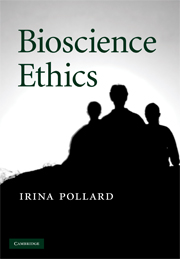Book contents
- Frontmatter
- Contents
- Preface
- Acknowledgements
- 1 Human origins, natural selection and the evolution of ethics
- 2 Sex determination, brain sex and sexual behaviour
- 3 Inappropriate lifestyle and congenital disability in children: basic principles of growth, toxicology, teratogenesis and mutagenesis
- 4 Substance abuse and parenthood: biological mechanisms – bioethical responsibilities
- 5 Fertility awareness: the ovulatory method of birth control, ageing gametes and congenital malformation in children
- 6 Understanding child abuse and its biological consequences
- 7 The state of wellbeing: basic principles, coping strategies and individual mastery
- 8 The state of wellbeing: on the end-of-life care and euthanasia
- 9 Current reproductive technologies: achievements and desired goals
- 10 The recombinant DNA technologies
- 11 Stem cells, nuclear transfer and cloning technology
- 12 Human-dominated ecosystems: re-evaluating environmental priorities
- 13 Human-dominated ecosystems: reclaiming the future for following generations
- 14 Human-dominated ecosystems: warfare = fitness enhancement or losing strategy?
- 15 Human-dominated ecosystems: reworking bioethical frontiers
- Further reading
- Index
15 - Human-dominated ecosystems: reworking bioethical frontiers
Published online by Cambridge University Press: 17 February 2010
- Frontmatter
- Contents
- Preface
- Acknowledgements
- 1 Human origins, natural selection and the evolution of ethics
- 2 Sex determination, brain sex and sexual behaviour
- 3 Inappropriate lifestyle and congenital disability in children: basic principles of growth, toxicology, teratogenesis and mutagenesis
- 4 Substance abuse and parenthood: biological mechanisms – bioethical responsibilities
- 5 Fertility awareness: the ovulatory method of birth control, ageing gametes and congenital malformation in children
- 6 Understanding child abuse and its biological consequences
- 7 The state of wellbeing: basic principles, coping strategies and individual mastery
- 8 The state of wellbeing: on the end-of-life care and euthanasia
- 9 Current reproductive technologies: achievements and desired goals
- 10 The recombinant DNA technologies
- 11 Stem cells, nuclear transfer and cloning technology
- 12 Human-dominated ecosystems: re-evaluating environmental priorities
- 13 Human-dominated ecosystems: reclaiming the future for following generations
- 14 Human-dominated ecosystems: warfare = fitness enhancement or losing strategy?
- 15 Human-dominated ecosystems: reworking bioethical frontiers
- Further reading
- Index
Summary
I would suggest that our real role as stewards on the Earth is more like that of the proud trades union functionary, the shop steward. We are not managers or masters of the Earth, we are just shop stewards, workers chosen because of our intelligence, as representatives for the others, the rest of life on our planet. Our union represents the bacteria, the fungi, the slime moulds and invertebrates, as well as the nouveau riche fish, birds, reptiles and mammals and the landed establishment of noble trees and their lesser plants. Indeed, all living are members of our union and they are angry at the diabolical liberties taken with their planet and their lives by people. People should be living in union with the other members, not exploiting them and their habitats. When I see the misery we inflict upon them and upon ourselves, I have to speak out as a shop steward. I have to warn my fellow humans that they must learn to live with the Earth in partnership, otherwise the rest of creation will, as part of Gaia, unconsciously move the Earth itself to a new state, one where humans may no longer be welcome.
The unprecedented and awesome power of science and technology, combined with the sheer number of people living on the planet, has transformed the scale of human impact from local and regional to global. It was pointed out in Chapter 12 that lag times, before the effects of human-driven change emerge, can often be long.
- Type
- Chapter
- Information
- Bioscience Ethics , pp. 263 - 280Publisher: Cambridge University PressPrint publication year: 2009



